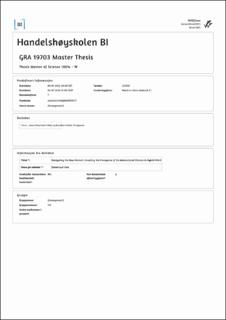| dc.description.abstract | Several organizations are now implementing a hybrid work model. In spite of this, there is lack of research that addresses the emergence of a motivational climate in hybrid work. This thesis explores the emergence of the motivational climate among employees using a hybrid work model, through the lens of motivational climate literature and social information processing theory. To better understand the employee’s perspectives and experiences, a qualitative approach was applied to collect descriptions of how they perceived the motivational climate in hybrid work. Based upon 14 semi-structured interviews, four antecedents emerged from the analysis: (1) information flow, (2) available and committed leader, (3) learning and development, (4) involvement. The findings indicate that the combination of communication methods used in the hybrid work model does not influence perceptions of motivational climate, but rather highlights the importance of the presence or absence of the four antecedents. Hence, this thesis provides insight to the literature and research on motivational climate, SIPT and hybrid work. Theoretical implications and contributions are discussed. | en_US |
